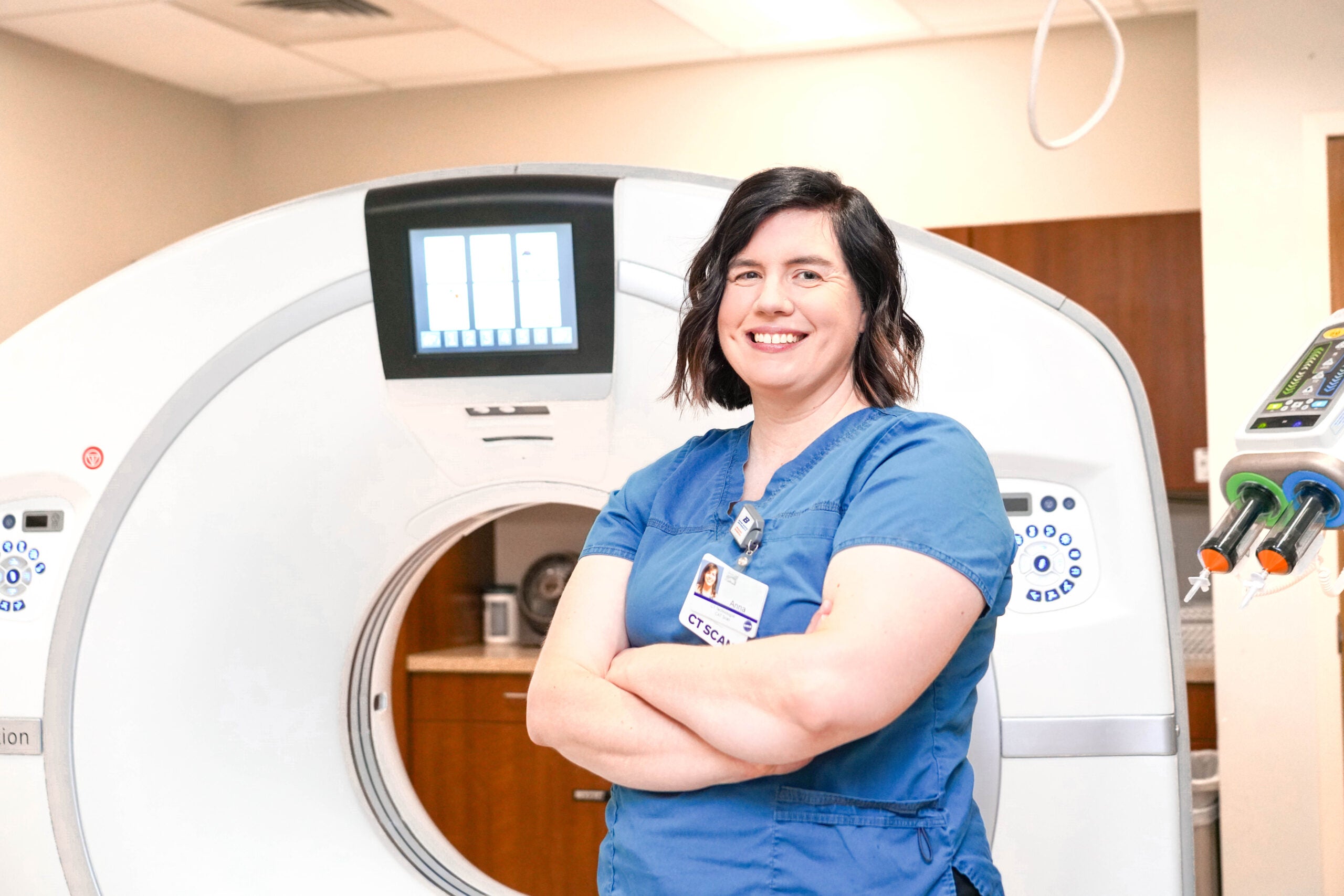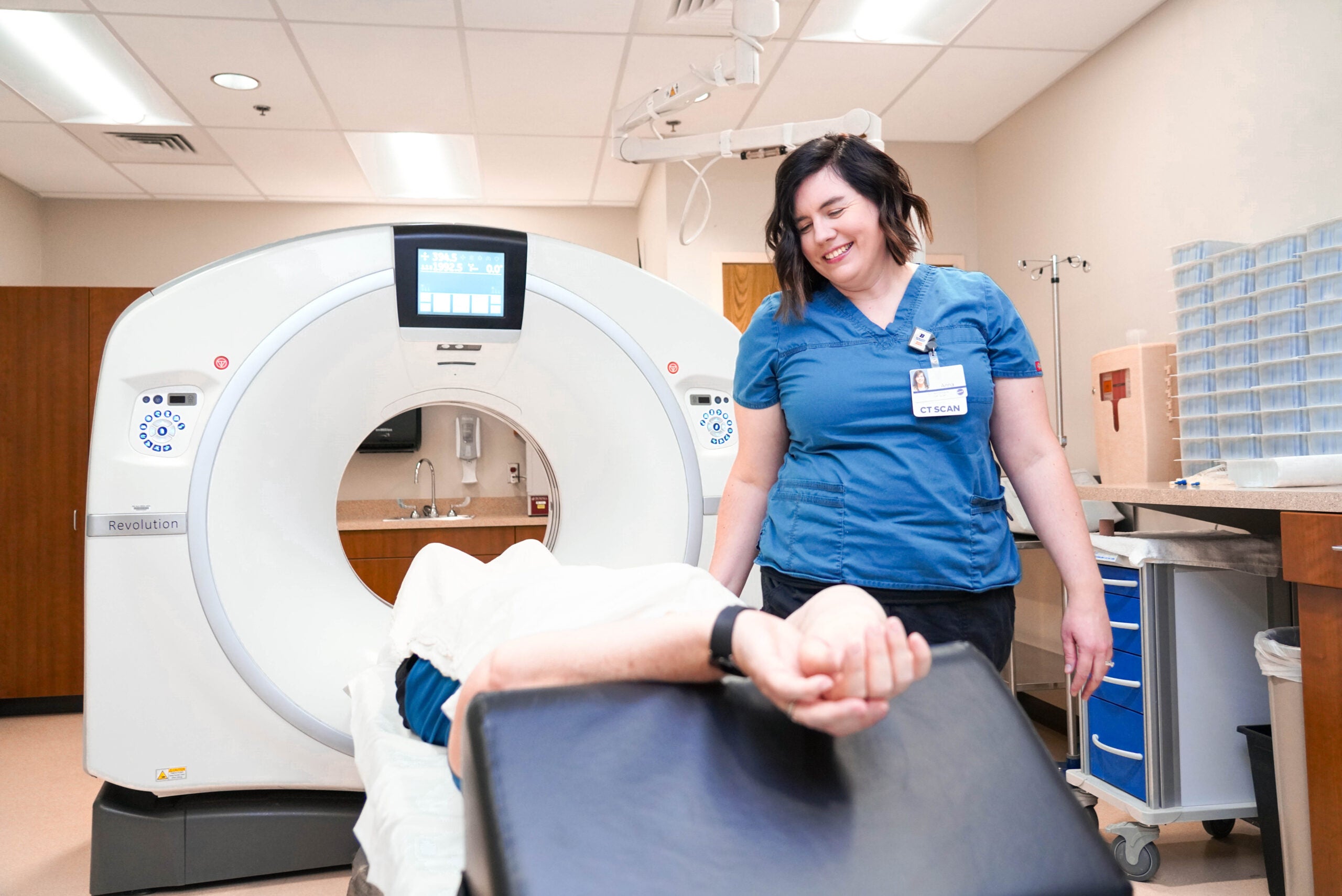Anna Schreiber epitomizes dedication and progress within Boise State University’s online Bachelor of Science in Imaging Sciences. Graduating in 2008, she witnessed the program’s remarkable evolution firsthand. Now an adjunct faculty member for the radiological sciences department, Schreiber brings valuable experience to shape the next generation of imaging professionals. Her journey from growing up in southwest Idaho to becoming an esteemed alum highlights the transformative power of an imaging sciences education.

Renowned Reputation for High-Quality Imaging Sciences Education
Settled in Meridian with her husband and 10-year-old son, Schreiber has worked at West Valley Medical Center in Caldwell since the spring of 2008. She initially started as an x-ray technologist but transitioned into full-time computed tomography (CT) scanning after graduating with a Boise State bachelor degree, CT emphasis.
Schreiber’s journey underscores her deep roots in the local medical community and her commitment to advancing her expertise. “I didn’t even have to research other imaging sciences programs,” she emphasized. “I grew up in the Boise area, and it was well-known that Boise State had one of the top radiology programs in the nation. It’s a respected program in the valley and northwest.” Schreiber’s decision reflects not only the program’s reputation but also its longstanding impact on the healthcare landscape in the region.
“The curriculum went above and beyond, especially for being a bachelor’s program,” Schreiber said. “We delved far more in-depth into each area of the curriculum, which I found incredibly valuable.” Schreiber highlights the program’s rigor and the resulting benefits for students entering the workforce. “I appreciated how much more comprehensive the education was,” she continues. “It was challenging and demanded a lot of effort, but the added knowledge we gained through the program was invaluable. That’s why Boise State techs were sought after.”
The Flexibility and Value of Online Learning
Although Schreiber graduated from the on-campus program in 2008, Boise State has since expanded its degree offerings. The online Bachelor of Science in Imaging Sciences is an associate-to-bachelor’s degree completion program for medical imaging professionals. With seven-week courses, students can complete their imaging sciences degrees in as few as 12 months. The curriculum also aligns with the American Society of Radiologic Technologists’ Bachelor of Science in Radiologic Sciences Core Curriculum.
“Online programs offer invaluable flexibility in daily life,” Schreiber, now an adjunct instructor for the online imaging sciences program, affirms. “A lot of students juggle part-time or full-time jobs but aspire to advance their degrees into another modality. This avenue gives them the opportunity to do so while still earning an income.”
Schreiber points to the accessibility of online programs, noting, “We can also accept students from out of state who need an online program to transition into another modality.” However, she acknowledges that online learning has its limitations. “Some people struggle with not having that interaction with a live, in-person teacher, or they find it challenging to keep up with online assignment due dates,” she said. “Everyone has different needs in their learning journey.”
Drawing from her personal experience, she shares, “I had several online classes during my schooling, and I really enjoyed the flexibility they offered. It wasn’t a struggle for me.” Schreiber recommends online learning for advanced modalities, emphasizing its benefits for those building on existing knowledge while balancing work and family commitments.

Is a Bachelor’s Degree in Imaging Sciences Worth It?
“A bachelor’s degree is absolutely worth it,” Schreiber asserts. “The education you receive sets you apart from a certificate program, and future employers recognize that distinction. With a bachelor’s, your pay is higher, and your knowledge base is significantly broader.”
Schreiber notes the importance of her educational trajectory, explaining, “Because the program was structured differently, I knew I wanted to pursue something beyond x-ray, and having at least a bachelor’s degree was crucial to me.”
Reflecting on her experience, she offers a resounding endorsement of bachelor’s programs in imaging sciences. “I would highly recommend a bachelor’s program for imaging. It’s worth every penny.”
Pursue Your Passion
“I am deeply grateful for the opportunity to pursue a degree in a field that truly interests me,” Schreiber expresses with heartfelt gratitude. “Not everyone gets the chance to follow their passion in such a meaningful way.”
Schreiber finds fulfillment in using her skills to assist others and finds joy in giving back to current students in the program. “I enjoy using my skills to help people, and I have relished the opportunity to share my knowledge with students currently going through the program,” she shares warmly.
Embracing the uncertainty of the future, Schreiber remains open to various possibilities within the imaging sciences field. “You never know what the future presents to you in your field, so I like to keep options open,” she reflects. “Some imaging techs go on to PA school or switch to another modality, while others pursue teaching or administrative roles. I’m simply seeing where it takes me!” Schreiber’s journey reflects the dynamic nature of the field and the myriad opportunities available to those with a passion for imaging sciences.
Learn More About Boise State Imaging Sciences Online
Advance your degree to pursue a career teaching and mentoring the next generation of medical imaging professionals with the online Bachelor of Science in Imaging Sciences program. Gain hands-on experience, develop your management and leadership skills and network with other learners nationwide. Prepare for new positions like department manager, administrator, lead sonographer, lead MRI technologist, director of radiology, imaging science instructor and more.